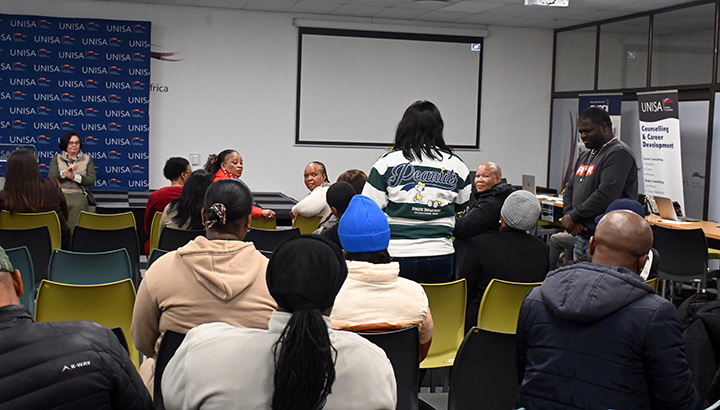News & Events
Student Services Roadshow puts student voices first

Sifundo Ndzube engages with students
The Office of the Dean of Students, in collaboration with the Student Representative Council, recently conducted the Student Service Delivery Roadshow in the Western Cape Region. The aim of the roadshow, which has been dubbed “The Year of the Student Campaign”, is to understand the challenges students experience within their student walk processes and to ensure that Unisa will provide fit-for-purpose, as well as fit-for-use, student support services. Fit-for-purpose services are those that meet student needs, while fit-for-use services are accessible when students need them.
To carry out this initiative effectively, a multidisciplinary delegation visited both the Cape Town Campus and the George Regional Centre. The team was composed of representatives from various Unisa units providing student support. Regional representatives from Facilitation of Learning, the Library and Career Counselling and Development also attended the Cape Town session. An invitation was sent to all students to allow them to engage with a service representative on a one-on-one basis.
Sifundo Ndzube was the programme director. The formal proceedings began with an address by Motale Nkgoang, Western Cape Regional Director, who warmly welcomed the representatives from Pretoria and the students who braved the weather to attend the session. Nkgoang stressed the importance of interventions such as these in contributing to the successful throughput of students. He reminded attendees that the increase in students qualifying for access to tertiary education has strained the system. “We want our students to finish in good time”, said Nkgoang, “so that we can make way for others to access higher education”.
Following Nkgoang’s remarks, Lizette Le Roux, Deputy Director for Student Development, addressed attendees on behalf of Dr Olwethu Sipuka, the Dean of Students. She emphasised that the purpose of the roadshow was to resolve student challenges in real time. In her opening remarks, she reiterated how important the sense of community was to students’ sense of wellbeing, including their mental health. She stated that interventions such as these were crucial to bring students together to feel as though they are a part of the university. The National Student Representative Council supported the roadshow and urged students to participate and make use of the services provided.
Echoing the importance of understanding students’ lived experiences, Student Representative Council Regional Chairperson Nomfundo Khumalo highlighted challenges that are often overlooked, such as a lack of transport, gangsterism in communities, and the effects of adverse weather conditions. “Charity begins at home,” she said. “We must address the needs of the ‘missing middle’ – students who do not qualify for funding yet cannot afford fees”. She urged students in attendance to use the opportunity to not only present challenges, but also to try to offer solutions. She expressed the hope that interventions such as these would continue to provide students with the support needed for their academic success.
With the formal presentations complete, the focus shifted to student engagement. Attendees were invited to interact directly with the representatives from the various departments. The general feedback from those in attendance was positive. The students who made the effort to attend were glad for the opportunity to consult directly with the staff members from Pretoria.
* By Vicky-Lee Lee Shew, Communication Officer, Unisa Western Cape
Publish date: 2025/09/05
